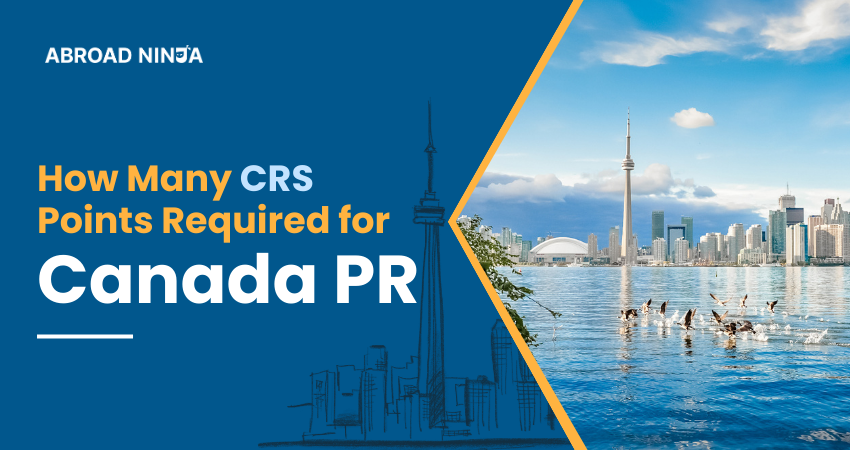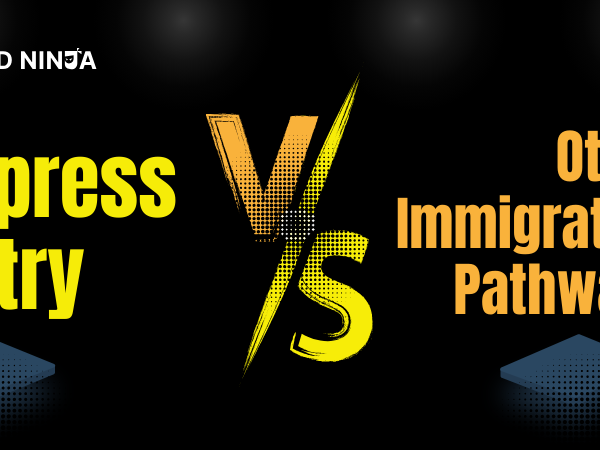Canada is a popular spot for people hoping to get permanent residency. Knowing the Express Entry system and the CRS (Comprehensive Ranking System) points is essential to get PR. The number of CRS points you need to get Canada PR changes with each draw. It depends on things like age, education, job experience, language skills, and more.
The Canadian gov regularly holds draws. They invite contenders with the highest CRS scores to apply for PR. These draws happen every two weeks. The minimum CRS points needed to get an invitation can vary, depending on labor market demands and the government’s immigration targets.
Want an invitation? Improve your CRS score. You can do this by: getting better language test results, gaining more job experience, finishing higher levels of education, obtaining a provincial nomination under a particular program, or having a valid job offer supported by a Labor Market Impact Assessment.
Having the minimum CRS score doesn’t guarantee an invitation. It only makes you eligible for the Express Entry pool. But, the higher your CRS score, the better your chances of getting an invitation fast.
Pro Tip: Talk to an immigration specialist before applying for Canada PR. Make sure you have all the documents you need and meet the eligibility requirements according to current rules.
Understanding the CRS Points System
The CRS Points System is a key factor in deciding if you get Canada PR. It looks at age, education, work experience, language ability and adaptability.
The following table shows the maximum points allotted for each CRS criteria:
| CRS Criteria | Maximum Points |
|---|---|
| Age | 110 |
| Education | 150 |
| Work Experience | 80 |
| Language Proficiency | 160 |
| Adaptability | 100 |
Age is the most important, so getting as many points as possible in each area helps with getting the permanent residency. Plus, if you get a high score, you can apply through Express Entry.
There are also other things that can give you CRS points, like a job offer from a Canadian employer (200-600 points!), a provincial nomination, French language skills, and having a sibling who is a citizen or permanent resident in Canada.
Interesting fact: IRCC (Immigration, Refugees and Citizenship Canada) created the CRS system in January 2015.
Note: This article is just about understanding the CRS points system, and does not talk about specific point requirements for Canada PR.
Eligibility Criteria for Canada PR
Getting Canada PR depends on many elements, such as age, education, work experience, language abilities, and adaptability. To qualify, candidates must meet the minimum standards in each category to acquire enough CRS points. See the table below for more info:
| Criteria | Points |
|---|---|
| Age | xx |
| Education | xx |
| Work Experience | xx |
| Language Proficiency | xx |
| Adaptability | xx |
Apart from these criteria, there are other vital details that can influence your chance of obtaining an invitation to apply for Canadian permanent residency. These include having a valid job offer from a Canadian employer, having a family member living in Canada as a citizen or permanent resident, and taking additional steps to raise your CRS score.
Now, here’s a story to demonstrate the significance of meeting eligibility criteria for Canada PR. Meet Sarah, a motivated professional who desired to start her new life in Canada. She devotedly worked on fulfilling the conditions and earned enough CRS points to get an invitation for permanent residency. Her hard work paid off when she eventually arrived in her new home.
Remember, understanding and satisfying the requirements is essential if you want to get Canadian permanent residency. So don’t miss out, and begin your own journey towards a brighter future in Canada!
Also Read: Provincial Nominee Programs PNPs for Canada PR
Calculating CRS Points
Age, Education, Work Experience, Language Proficiency and Other Factors are all taken into account when calculating CRS points.
Points are awarded based on Age Range, and different Points for Different Levels of Education.
Work Experience is considered, and Points for Language Proficiency in English or French.
Bonus Points can be awarded for Canadian Study Experience or Sibling in Canada.
Plus, spouse’s characteristics and skill transferability can also contribute.
A thorough assessment is key to get the most CRS points and increase chances of Canada PR.
Fact: This info comes from the official Government of Canada website (source: www.canada.ca).
Minimum CRS Points Required for Canada PR
Comprehending the minimum CRS points needed for Canada PR is essential for those wanting to immigrate. These points are based on factors such as: age, education, work experience, language proficiency, and adaptability.
To clarify, here is a table outlining the minimum CRS points needed for Canada PR:
| Factors | Minimum Points |
|---|---|
| Age | 100 |
| Education | 140 |
| Work Experience | 60 |
| Language Proficiency | 136 |
| Adaptability | 50 |
It’s essential to realize that these numbers can change, as the Canadian government updates its immigration policies regularly. It’s wise to check official sources for the latest information.
Also, it’s worth mentioning that just meeting the minimum CRS point requirements does not guarantee an invitation to apply for Canadian Permanent Residency. The Comprehensive Ranking System (CRS) works on a draw system, where candidates with higher scores get invitations first. So, it’s critical to aim for a competitive score above the minimum threshold.
A fact about the minimum CRS points required for Canada PR is that in recent years, the cut-off scores in Express Entry draws have been higher due to increased competition among applicants. This can be confirmed through official sources such as Immigration, Refugees and Citizenship Canada (IRCC).
Strategies to Increase CRS Points
To get more CRS points for Canada PR, there are lots of ways.
- Get high marks in tests of English or French to demonstrate language skills.
- Get further qualifications or certifications to up your educational credentials.
- Get relevant work experience in a skilled job to gain CRS points. Plus, get a valid job offer from a Canadian employer to maximize your points.
Also, stay healthy and present accurate documents to raise your CRS points.
Moreover, having a sibling living in Canada or studying there can give you more CRS points.
Do all this carefully and you can increase your CRS points and the chance of getting PR status in Canada.
Conclusion
The CRS points for Canada PR are very important for wannabe immigrants. The Canadian immigration authorities decide who qualifies based on their CRS score. This score considers age, education, work experience, language proficiency and adaptability. If applicants achieve the necessary CRS points, their chances of getting permanent residency in Canada will be improved.
It’s vital for candidates to check their qualifications thoroughly and identify which areas need improvement. Enhancing language skills through tests like IELTS or CELPIP can increase an applicant’s CRS score. Getting higher education degrees or extra work experience can also help to boost the CRS points.
Apart from the main factors, provincial nominations and job offers from Canadian employers can offer more CRS points. Candidates must stay up-to-date with government policies and eligibility rules to optimize their chances of achieving the necessary CRS score. Comprehending the CRS points’ history shows how immigration policies have changed over time. Formerly known as the ‘Pass-Mark,’ the Comprehensive Ranking System (CRS) was launched in 2015 as a clear way of judging skilled immigrants for economic immigration programs. Its goal is to pick individuals who have a strong chance of succeeding economically and fitting in well with Canadian society.
Frequently Asked Questions
FAQs on CRS Points required for Canada PR
1. What are CRS points and how are they calculated?
CRS (Comprehensive Ranking System) points are used by the Canadian government to rank candidates in the Express Entry pool. These points are awarded based on factors such as age, education, work experience, language proficiency, etc. The higher your CRS score, the better your chances of receiving an invitation to apply for permanent residency.
2. How many CRS points do I need to be eligible for Canada PR?
The minimum required CRS points can vary with each Express Entry draw conducted by the Canadian government. The cutoff score is determined based on the overall pool of candidates and the number of invitations available. It is advisable to have a CRS score above the most recent cutoff point to maximize your chances of receiving an invitation.
3. What can I do to increase my CRS score for Canada PR?
There are several steps you can take to increase your CRS score. You can improve your language proficiency, obtain additional education or certifications, gain more work experience, secure a valid job offer from a Canadian employer, or obtain a provincial nomination through a provincial nominee program (PNP).
4. Can I apply for Canada PR if my CRS score is below the cutoff point?
If your CRS score is below the cutoff point in a specific Express Entry draw, you may not receive an invitation to apply for Canada PR. However, you can continue to improve your CRS score and wait for the subsequent draws to have better chances. Additionally, exploring provincial nominee programs or other immigration streams may provide alternative pathways to Canada PR.
5. How frequently does the Canadian government conduct Express Entry draws?
The Canadian government conducts Express Entry draws at regular intervals, often on a bi-weekly or monthly basis. The frequency of draws can vary depending on the Canadian immigration authorities’ requirements, processing timelines, and the number of candidates in the Express Entry pool.
6. Is the CRS score the only criterion considered for Canada PR?
No, the CRS score is not the only criterion considered for Canada PR. Candidates must meet other eligibility requirements, including health and character checks, proof of funds, and admissibility criteria. CRS score is just one of the factors that determine your eligibility and ranking in the Express Entry system.




